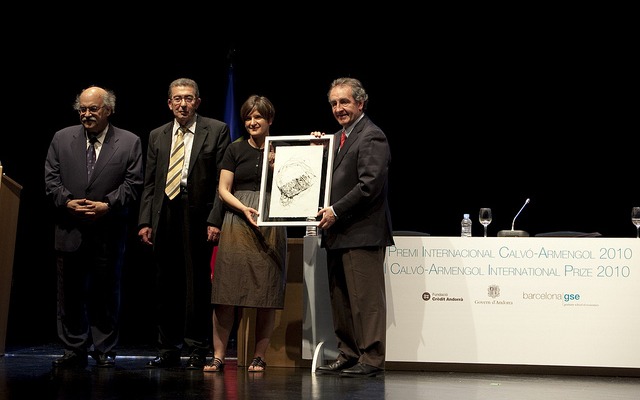research
Award ceremony in Andorra honors Esther Duflo, first winner of the Calvó-Armengol Prize

Prof. Esther Duflo (MIT) formally received the first Calvó-Armengol International Prize on Saturday, June 5, 2010 in Andorra, the homeland of the Prize's namesake Prof. Antoni Calvó-Armengol (ICREA-UAB and BSE). The Prize is awarded every two years to a top researcher in economics or social sciences younger than 40 years old for his or her contribution to the theory and comprehension of the mechanisms of social interaction.
Presiding over the award ceremony were authorities from the three entities that organize the Prize: Mr. Jaume Bartumeu, Head of the Andorran Government; Mr. Antoni Pintat, President of the Crèdit Andorrà Foundation; and Prof. Andreu Mas-Colell, Chairman of the BSE.
Collaboration and reflection, keys for scientific excellence
The Calvó Prize, Prof. Mas-Colell explained, is a way to carry on the plans and vision of Prof. Calvó. "Toni thought, and he was right, that the advance of science requires the occasional retreat to places that are a bit remote, quiet, and beautiful," Prof. Mas-Colell said during his opening remarks. "He dreamed of making Andorra a meeting point for international scientific activity."
To that end, the Prize activities in Andorra include a highly selective international academic workshop, directed by the Prize winner, Prof. Duflo. The workshop, together with her Calvó-Armengol International Prize Lecture, delivered in Barcelona and entitled "Gender equality and development," were two opportunities for Prof. Duflo to share her outstanding research with the international scientific community.
"An award's prestige is a reflection of the prestige of its recipients," Prof. Mas-Colell said during the award ceremony. "With Prof. Duflo, we're starting off very well indeed."
Social relationships, the missing variable
In her acceptance speech, Prof. Duflo pointed to connections between Prof. Calvó's work and her own. "We share a sense of what economics can (and should) do for society," she said. "Toni's work has given us the methodological tools for incorporating non-market social relations within the framework and the mathematical language familiar to economists" - something that has been ironically lacking in economic research, according to Prof. Duflo.
Prof. Duflo organized the weekend's workshop around the theme of social networks, a central topic in Prof. Calvó's research. "I have invited experienced researchers and students," Prof Duflo said. "I sent them on a mountain walk so they could get to know each other better. I think that's what Tony would have liked, and I am grateful for the possibility of organizing a seminar here as part of the Prize."
